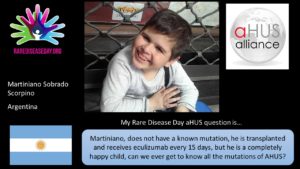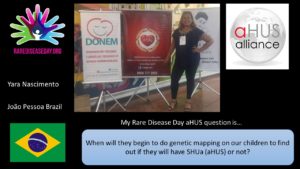Genetics is very important to aHUS patients. aHUS is a very rare genetic diseases. aHUS patients get to know and understand more about the immune system than many doctors!
aHUS patients get to know that rare changes in their genetic make up , make them predisposed to their condition.
Decades ago it was thought there was something about Complement components that made aHUS patients different and at risk of this disease.
It was 20 years ago that the first genetic mutation was found in complement in Factor H and in one small part of it , in doctors’ speak, “SCR20”, and the mutated version was called in very clever doctors’ speak
c.3643C>G; p. Arg1215Gly
Since then hundreds of mutations have been found not only in Complement Factor H, but also in other components like CFI, CFB C3 etc. One of the most comprehensive lists of complement component mutations in the world is held by the University College of London and can be seen at this website ( click here), and at this link ( click here ) the 193 CFH variants alone can be viewed. One thing that is clear from looking at the list is that many of the CFH mutations do not play a significant disease causing role in aHUS, occasionally in other complement diseases like AMD or MPGN but not aHUS.
When a new aHUS patient on sets, and is diagnosed, it remains important to know if the patient has a complement mutation, which had predisposed them to aHUS. Having that information is important for prognosis ( expected outcome) and management of treatment going forward. If one is found it confirms diagnosis; but it was not essential to know about it before starting treatment.
Except that for some patients who are tested for all the “known” mutations, none can be found, not even newly created ones, and those patients are said to be idiopathic – spontaneous and with no known cause.
Two of the questions in the Rare Disease Day video are from patients in just this position

Maelys mother from France asks “My daughter is part of the 30% with no known mutation . Will we ever know her mutation so her doctors can know what her best treatment is”
Martiniano’s mother from Argentine ask ” Martiniano does not have a known mutation and he is transplanted and receives eculizumab every 15 days but he is a completely happy child, can we ever get to know all the mutations of aHUS “

Even without knowing the actual mutation being part of the idiopathic group might in itself give doctors some idea of what happens to such patients from research which reports on this particular cohort.
For some however the issue is about getting access to genetic testing to know whether or not they have a genetic predisposition.

Yara of Joao Pessoa Brazil asks ” When will they begin to do genetic testing mapping of our children to find out if they will have SHUa( aHUS) or not”
It could be argued that , when it comes to aHUS treatment, not funding testing for genetic causes is false economy as it may lead to ineffective use of health resources.
Genetics is a very important part of the aHUS Research Agenda.
- Knowing if there is a genetic fault does not prevent an aHUS diagnosis nor commencing treatment
- There are many combinations of genetic codes and one alteration can cause a new mutation
- The mutation has to be significant and rare to be of interest for aHUS
- Not all mutations are aHUS disease causing
- No mutation will be found in between 25 to 50% of patients tested for aHUS known mutations
- Having genetic test results helps with management of the diseases and decisions that need to be made
- Not having genetic tests is false economy for healthcare providers
For those in families where aHUS has happened, it may run in others in the family. They may face the choice on whether parents or siblings or children /grandchildren should be tested .
What is the best thing to do – to know about it or not?
Now ,Martiniano, Yara and Maelys, that is a question that the aHUS community could answer.,

